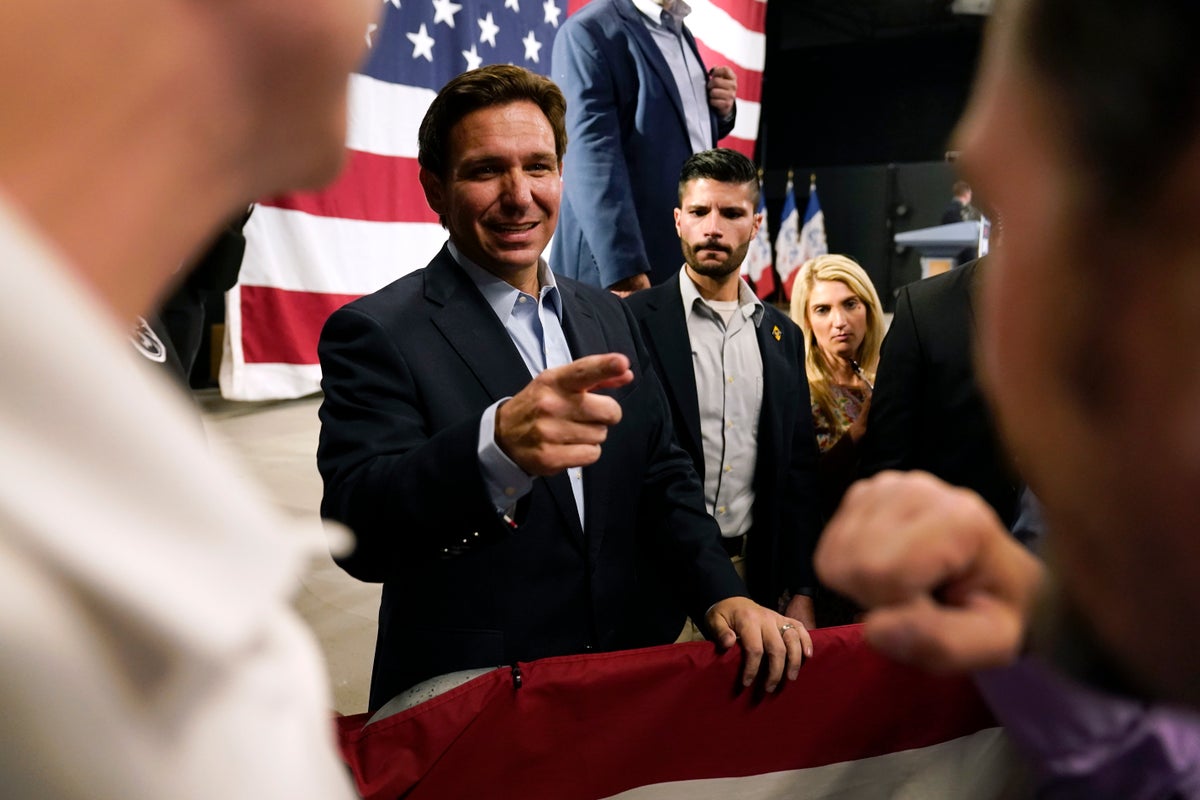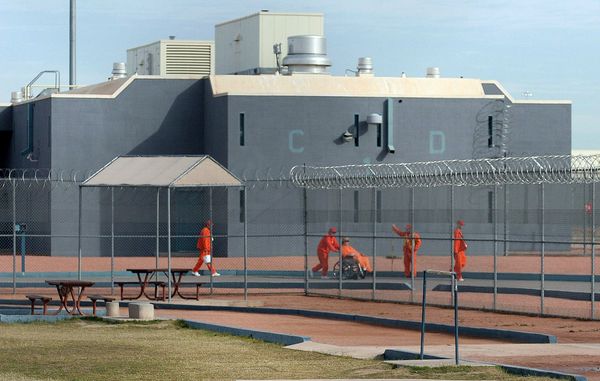
Ron DeSantis begins his first full day of presidential campaigning on Wednesday with a four-stop blitz through Iowa, trying to prioritize personally connecting with voters while proving he has the mettle to take on former President Donald Trump.
The Florida governor has appearances in Sioux City, Council Bluffs, Pella and Cedar Rapids, packing in early events in the state whose caucuses kick off the GOP presidential primary voting. From there, he will head to New Hampshire on Thursday and South Carolina on Friday.
At his Iowa kickoff event on Tuesday night with wife Casey, DeSantis was initially cautious while addressing an energetic crowd of roughly 500 gathered inside a suburban Des Moines church. But speaking to reporters afterward, he pushed back against Trump in a way he had not before on the national stage.
He accused Trump of essentially abandoning “America First” principles on immigration, supporting pandemic-related lockdowns and generally having “moved left” on key issues.
And DeSantis laughed off any criticism the former president had lobbed his way over his leadership in Florida, particularly on the state's response to COVID-19.
“Hell, his whole family moved to Florida under my governorship. Are you kidding me?” DeSantis said.
DeSantis’ comments came a week after a stumbling Twitter announcement that raised questions about his readiness for a national campaign. Beyond the glitchy launch, DeSantis opens his campaign looking up at Trump in the polls amid persistent questions about the Florida governor’s ability to connect with voters in person.
Despite only recently formally joining the race, DeSantis has for months been dogged by criticism that he seems halting and uncomfortable when interacting with everyday Americans — despite a stage presence that can be commanding.
He also tends to limit his interactions with the media to those involving reporters from friendly media outlets, largely ensuring he doesn’t have to answer tough questions.
Kate Romano, 60, of Indianola, Iowa, said Tuesday night that she was more impressed by DeSantis than she expected, calling him energetic and fun to hear. She voted reluctantly for Trump in 2016 and 2020, and she’s interested in hearing from other candidates.
DeSantis, she said, is “the one who’s piqued my interest right now.”
“I liked to hear that he’ll stand up to Trump,” she said.
Kim Riesberg, 59, who attended DeSantis’ campaign kickoff with her husband, said she, too, voted for Trump in 2016 and 2020, but is not necessarily committed to him this time around.
DeSantis is a “little softer,” said Riesberg, of Dallas Center, Iowa. And “more appealing to the masses.”
Trump and his allies unleashed a fresh round of anti-DeSantis attacks on Tuesday, sharing new polls showing he's the heavy favorite in the GOP race and taking aim at DeSantis' leadership during the pandemic.
At the same time, a pro-Trump super PAC was running ads on Iowa television accusing DeSantis of wanting to raise taxes, an accusation DeSantis has denied.
The feud will have an opportunity to play in public as the week progresses, with both men courting voters in key states on the presidential primary calendar.
Trump, who was already scheduled to be in Iowa on Thursday, added a couple of stops in the state to his schedule for Wednesday, ensuring he would overlap with DeSantis for a time. Trump will tape a radio appearance in Des Moines before attending a GOP legislative dinner.
DeSantis, meanwhile, will be back in Iowa on Saturday for an event for 2024 GOP hopefuls hosted by Sen. Joni Ernst. They will be joined by declared candidates including Sen. Tim Scott, R-S.C. and former United Nations Ambassador Nikki Haley, along with former Vice President Mike Pence, who is expected to launch a campaign soon.
DeSantis met with evangelical pastors Tuesday ahead of his evening speech at the church, where he largely received an energetic response as he called for “a revival of American greatness.”
The crowd was especially receptive to his focus on conservative cultural issues, particularly gender identity, which he has targeted with legislation that bans instruction or classroom discussion of LGBTQ+ issues in Florida public schools for all grades.
“Our country is going in the wrong direction. We can see it and we can feel it,” DeSantis told the crowd in the church auditorium plastered with red, white and blue signs proclaiming a “Great American Comeback.” Hundreds more watched from an overflow room.
In his hourlong speech, DeSantis included a handfuls of indirect jabs at Trump. He said the nation needs “a disciplined, energetic president who will spit nails and fight the needed battles every single day over an eight-year period.”
Trump, of course, would be limited to one term.
He also said Republicans would end their “culture of losing” only by making the 2024 election a referendum on President Joe Biden. Trump, with his big personality and legal entanglements, has essentially made every election a referendum on himself.
But speaking to reporters and a small group of supporters in another room afterward, DeSantis addressed the feud head on. He noted that he avoided criticizing Trump while he was in the White House.
“When we disagreed, I never bashed him publicly because he was taking all this incoming from the media, the left, and even some Republicans. And the whole collusion was a total farce. And he was treated very, very poorly. And that bothered me, and it still bothers me to be honest.
“So, I never really would air those disagreements,” DeSantis added. “Well, now he’s attacking me over some of these disagreements, but I think he’s doing it in a way that the voters are going to side with me.”
There are signs the attacks could be wearing on voters who might otherwise support Trump.
Jack Spoonemore, a 20-year-old of Adel, Iowa, attended DeSantis’ appearance to see what energy the Florida governor would bring. He said he supported Trump in 2020, but he’s interested in perusing other candidates.
“I’m not a huge fan of the shade,” he said of Trump’s attacks on DeSantis.







